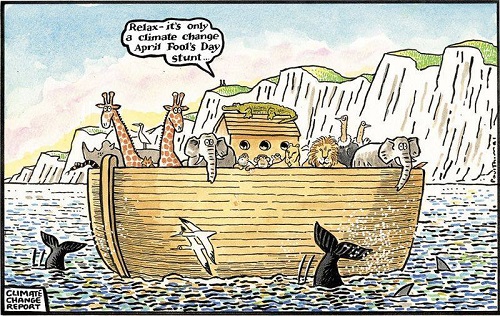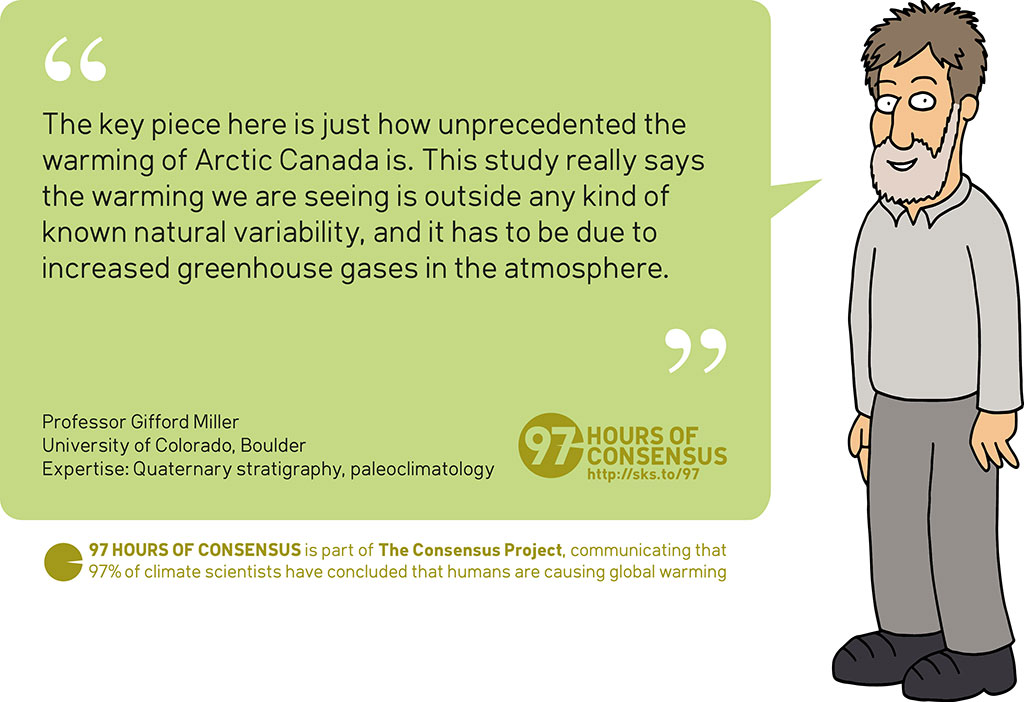
Story of the Week... Editorial of the Week... Toon of the Week... SkS in the News... Photo of the Week... SkS Spotlights... Video of the Week... Coming Soon on SkS... Poster of the Week... SkS Week in Review... 97 Hours of Consensus...

UNITED NATIONS — Nuclear weapons? Famine? Civil war? Nope.
The United Nations secretary general, António Guterres, on Thursday called climate change “the most systemic threat to humankind” and urged world leaders to curb their countries’ greenhouse gas emissions.
He didn’t say much, though, about the one world leader who had pulled out of the landmark United Nations climate change agreement: President Trump.
Instead, Mr. Guterres suggested that Mr. Trump’s withdrawal from the Paris accord nearly a year ago didn’t matter much. The American people, he said, were doing plenty.
“Independently of the position of the administration, the U.S. might be able to meet the commitments made in Paris as a country,” the secretary general said. “And, as you know, all around the world, the role of governments is less and less relevant.”
Biggest Threat to Humanity? Climate Change, U.N. Chief Says by Somini Sengupta, Climate, New York Times, Mar 29, 2018
As Trump forces America’s attention span to shrink, we are unable to address the threats that could fundamentally endanger American national security

Donald Trump’s daily assaults on American democracy and the pillars of America’s role in the world are disastrous – and they are also distracting America from even bigger global challenges. At just the moment when the United States must be joining together with the rest of the world to confront three existential threats – climate change, challenges to democracy, and the rise of China – Americans are forced to spend every waking minute mitigating Trump’s damage.
In Trump’s America, it’s hard to keep up. The news and controversies come so quickly they eat into each other’s news cycles. Actions by the Trump administration that previously might have brought down a presidency (or at least merited a congressional inquiry) pass in a matter of hours as the next jaw-dropping scandal explodes.
As Trump forces America’s attention span to shrink (was that even possible?), we are unable to address the three threats that could fundamentally endanger American national security.
First, climate change. It’s hard to overstate the magnitude of this threat. The seas are rising, imperiling hundreds of millions of people in coastal communities from Shanghai to Miami. Climate change is likely enhancing the devastation of extreme weather like storms and heatwaves.
Unless national and global actions are taken, the World Bank estimates that by 2050, more than 140 million people in Latin America, sub-Saharan Africa, and South Asia will be forced to leave their homes because of climate change. The near to mid-term effects of the heating planet could affect hundreds of millions. The long-term effects could wipe out humanity.
Preventing the worst effects of climate change and reversing its course would require a global effort the likes of which we’ve only seen in the movie Independence Day, in which the countries of the world put aside their disagreements to fight an alien invasion threatening all of humankind. That’s how difficult this would be in normal circumstances.
But in Donald Trump’s world, we are moving backwards, from announcing the intention to withdraw the United States from the Paris climate agreement to gutting the federal government’s role as a defender of the environment.
The necessary efforts of actors like the US Climate Alliance to encourage US states to continue the transition away from dirty fuels can only do so much in the absence of presidential leadership. And America has vacated the global effort – and abandoned its leadership role – to forge solutions.
Trump distracts America from the task of facing three existential threats, Opinion by Michael H Fuchs, Guardian, Mar 30, 2018

Hat tip to Stop Climate Science Denial.
In his article, About half of Americans don’t think climate change will affect them — here’s why (The Verge), Alessandra Potenza writes:
But temperatures are going up everywhere, not just in the Arctic; cities are especially hard-hit and heat waves are becoming more frequent. Extreme weather events — like wildfires and hurricanes — are also becoming more extreme. These changes are consistent with a warming world, scientists say. That sort of makes sense: though the Gallup poll found that while only 64 percent of Americans think that global warming is caused by human activities, 97 percent of climate scientists believe that.
The final link embedded in the above paragraph is to: Consensus on consensus: a synthesis of consensus estimates on human-caused global warming, Cook et al, , ,
In his article, Darren Aronofsky’s New TV Series Breaks With The Hollywood Playbook On Climate Change (HuffPost), Alexandar C Kaufman quotes John Cook:
“Film has a huge role to play in climate communication,” John Cook, a researcher at George Mason University’s Center for Climate Change Communication, told HuffPost. “Science can communicate facts, but unfortunately, that only gets us so far. We need art to shape the facts of climate change in narratives and frames that resonate with the general public.”

The Environmental Data & Governance Initiative (EDGI) is an international network of academics and non-profits addressing potential threats to federal environmental and energy policy, and to the scientific research infrastructure built to investigate, inform, and enforce them. Dismantling this infrastructure — which ranges from databases to satellites to models for climate, air, and water — could imperil the public's right to know, the United States' standing as a scientific leader, corporate accountability, and environmental protection.
In response, EDGI is building online tools, events, and research networks to proactively archive public environmental data and ensure its continued public availability. We also are monitoring changes to federal regulation, enforcement, research, funding, websites and general agency management at agencies including EPA, DOE, NASA, NOAA, and OSHA. We aim to serve the environmental community and its allies, and to enable them to hold the new administration accountable, by preserving and improving public access to at-risk government environmental data, documents, and digital interfaces, and by monitoring, documenting, and analyzing change to federal environmental agencies. We also aim to create an open, collaborative network of individuals, non-profits, universities and companies who believe that science and data are vital for environmental governance.


Gifford Miller's bio page and quote source.
High resolution JPEG (1024 pixels wide)
Posted by John Hartz on Sunday, 1 April, 2018
 |
The Skeptical Science website by Skeptical Science is licensed under a Creative Commons Attribution 3.0 Unported License. |